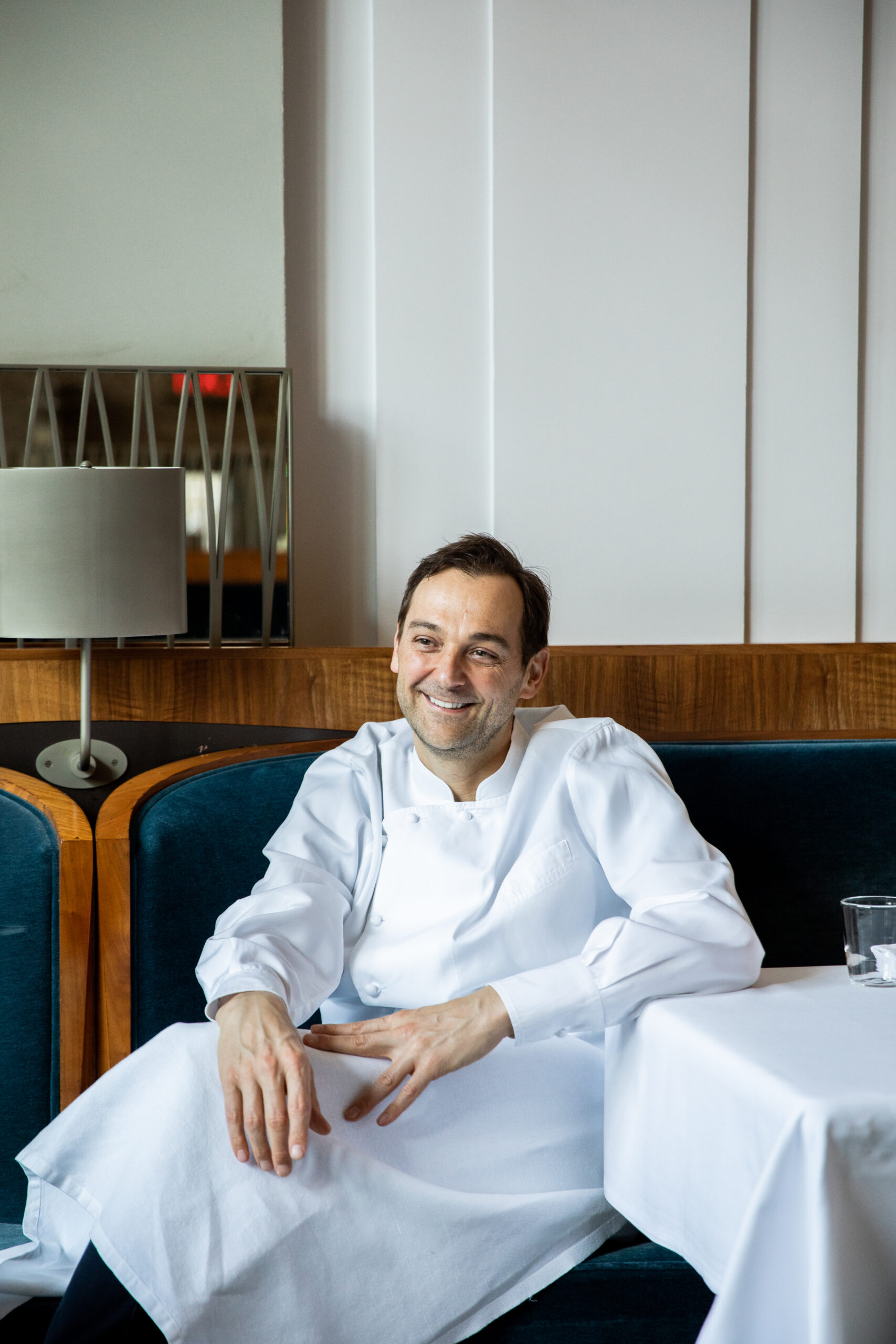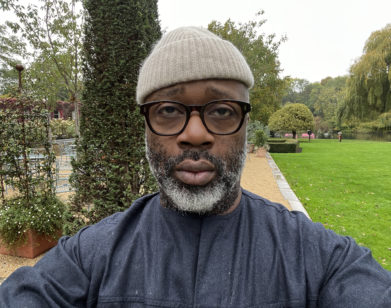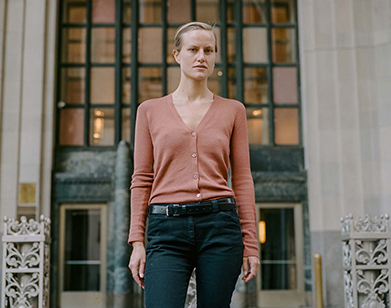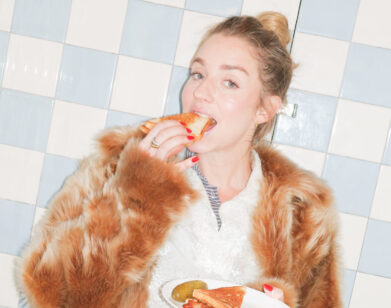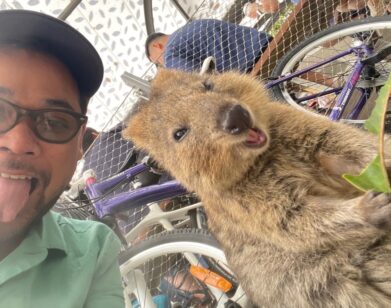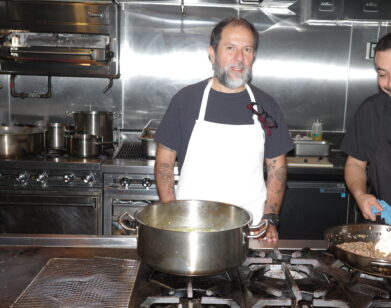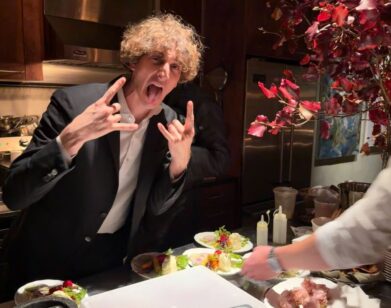YES, CHEF
Chef Daniel Humm Is Begging You to Eat More Plants
“In this five or six-year period that I’ve known you,” Gabriela Hearst says of her friend, the chef Daniel Humm, “I’ve seen you go from number one in the world, to bankruptcy, to starting a soup kitchen, to going plant-based, to being criticized for being plant-based, to three Michelin star plant-based.” Stretch back ever farther, to the year 1998, when Humm first opened the fine dining mecca Eleven Madison Park, and his journey from endurance athlete to visionary gourmand seems even more improbable, and impressive. Last month, Humm celebrated the 25-year anniversary of EMP, which eliminated all animal products in 2021, with the release of Eat More Plants: A Chef’s Journal, a collection of drawings, memoranda, and random notations that functions as a rare peak inside Humm’s perpetually enterprising and adaptable mind. To honor the occasion, he got on Zoom with Hearst to talk about Miles Davis, running marathons, and taking the path less followed.
———
GABRIELA HEARST: Hola! I’m so excited to be doing this because two days ago you complained that your texts were not being responded to fast enough.
DANIEL HUMM: I know, it’s like I’m having a monologue. But today we’ll have a dialogue.
HEARST: Today’s going to be a dialogue because you are one of the three human beings that I admire the most, and probably number one. I always feel honored to not only be your friend, but to celebrate your career and how much you’ve transformed yourself as a creative. Looking back, would you have expected this transformation?
HUMM: Firstly, thank you for all the sweet words. I think we bonded because we see the world and our work in a similar way and we want to push the envelope in the luxury field. When we first met, I was still trying to reach this mountaintop that I set out 20 years before, which was to have the best restaurant in the world. It was a mountaintop of chasing accolades that was definitely motivated by my ego and my team’s ego. I’m not saying ego is a bad thing, but it was too much of a force. You know this, but when I was in my early twenties, I was on the path to be a professional cyclist when I had a bad accident that put everything at a halt, and I really only had one other passion, which was cooking. So I took this athlete’s mentality towards my career. I wanted to be the best, I wanted to win every award. I always understood intellectually that none of these awards are that meaningful on their own, but it did make the restaurant better. In 2017, after we met, we became the best restaurant in the world. It was really disorienting because at that point there was not a single award left. I was only 40 years old and had achieved everything I ever dreamed of, which created a lot of problems because it was unclear where we were going next. We talked every day for 20 years about reaching that summit, and we never spoke about what we would do once we reached it. I knew that there had to be higher meaning, and it took me a while to figure it out, but I co-founded an organization called Rethink Food, where we take food from restaurants to prepare meals for people in need.
HEARST: During COVID?
HUMM: COVID hit and our restaurant just fell apart overnight. There are no Eleven Madison Park tables on the sidewalk. It’s just not that kind of business. We literally had no business at all for two straight years and we faced bankruptcy. But 25% of New York City was food insecure and I felt I had this responsibility. So even through extreme financial challenges, I started feeling so happy about the work. I got up in the morning and I was like, “Wow, this really matters.” The two-dollar meals in cardboard boxes really made a difference in people’s lives. So when it was time to reopen the restaurant, I felt the responsibility to use my and my team’s creativity towards plant-based eating. From a creative place, the world does not need another dry-aged ribeye or butter-poached lobster. The creativity needs to go towards plant-based eating, because we’re moving there.
HEARST: As you were talking, I was thinking that in this five or six-year period that I’ve known you, I’ve seen you go from number one in the world, to bankruptcy, to starting a soup kitchen, to going plant-based, to being criticized for being plant-based, to three Michelin star plant-based. Nobody’s been there. I told you to stop running marathons because you’re ruining your legs, and [I told you] not to go plant-based because you’re going bankrupt—
HUMM: I take your advice on how to dress.
HEARST: But you also lowered your marathon time to less than three hours. I am your witness. I’ve seen the [David] Beckham documentary and I’m like, “They have nothing on Daniel Humm. The guy is like Mr. Comeback.” People think success is linear, but success is ups and downs, circling around, and you have done what the most admirable creatives and thinkers always do, which is retreat from the system.
HUMM: It took me a long time to find myself. When we reopened the restaurant, at first everyone came, and then we eventually got criticized, mostly by people who never came. And being criticized is really challenging no matter how confident one is. It makes you and your team doubt, and then you have to check yourself. But I was not prepared. I just thought from a creative place. Sometimes people say, “That was such a genius idea to go plant-based.” Honestly, it’s not genius at all. It’s obvious. If one pays attention to the world while working in food, there is only one place to go, and that’s cooking plant-based. I’m not an expert in climate or food systems or farming, but I’m an expert in what ingredients come to my kitchen. The first thing I was taught as a chef was to always start with the best possible ingredients, and all the animal products are no longer superior products. If my job is to bring the best ingredients to my guests, I can no longer serve meat or fish because those ingredients are from factory farming. The chickens have bird flu. The fish is full of plastic. The beef is filled with antibiotics. The Amazon is burning. There’s only one place to go as a creative. But I wasn’t prepared to be this much of an outsider, and it has had its challenges.
HEARST: There’s a line from Don Quixote that translates to, “They’re barking, Sancho. It’s a sign that we’re moving forward.” It’s about being an outlier in thinking. And I agree that sometimes common sense can be perceived as genius, but seeing something so obvious to one but blind to most is really where the genius lies. You may have been the first to do it, but others will follow. And that’s the bigger mission in the poetry of your food. I eat it season by season and you can see how your symphony is just getting better and better. Even being the top restaurant in the world, you’re still honing.
HUMM: I think we need to really change dramatically, and it’s so true in your world. What materials are we using, and what is the new luxury? It’s inspiring to talk to you because I think what we do is so similar. We work with raw materials. We are on a seasonal schedule. You have your shows coming up, and they cannot wait. What we do is like creating four collections a year. There is a message, there is beauty, there is the quality of ingredients, there is craft, there is art, there is leadership, there is storytelling. Sometimes the world isn’t so open to people pushing boundaries. Honestly, it shocks me that I had the courage to take this risk. I think it’s because during the pandemic, I didn’t have too many people around me to talk me out of it.
HEARST: I tried.
HUMM: Yeah. And as we got closer to reopening, worries did come. I’m bringing back a team of 250 people, and everyone is relying on a job. This is not just an artistic endeavor; it’s our livelihood. No matter how important the idea is, if we don’t succeed commercially, our whole endeavor will not matter. Early on, one of the criticisms we got was because we had a private dining room where we sat people who made reservations and paid deposits before COVID. So when we reopened as a fully plant-based restaurant, we decided to honor the reservations that had been booked before the pandemic.
HEARST: And that was the “secret meat room”?
HUMM: Exactly. We got attacked by people saying, “At Eleven Madison Park, somewhere hidden upstairs there is a private meat room for the rich.”
HEARST: Another thing that I think people don’t get right is the human intelligence that goes into formulating. It’s really like lab work, how many chefs and clever heads are working around creating a vegetable dish. Maybe people think this is just eggplant, but there is a journey of that eggplant that has been treated and experimented with and tested for so long. As you just pointed out, if this doesn’t work as a business, if it’s not delicious, there’s no point in putting it out there. So it has to not only taste incredible, but it’s Daniel Humm, so it has to look like a painting. People say, “Why are you charging so much for an eggplant?” But it’s a really thought-through eggplant, and it’s a really special sensorial experience that you’ve probably never had before. I’ve tasted flavors I’ve never tasted before in your restaurant. At the end of the day, just like in my industry, the product will talk. That’s why you’re still dancing.
HUMM: And we do this night after night, and that speaks louder than any criticism. Maybe it’s because I was an endurance athlete, but I will endure any criticism and still be there in the end.
HEARST: And with Eat More Plants, I get to see the little boy. I get to see the creativity and the curiosity and the honesty and the childlike heart in the drawings. Do you want to tell me more about the book?
HUMM: Thank you, and I feel that way about you too. You’re such an inspiration in your drive and your research, but there’s another side of you: your curiosity. You’re constantly bringing new things into my world. It could be music or anything else. And if you look at my journal, it looks like a child did it. My journals haven’t really evolved. They look just as they did when I was 15 years old.
HEARST: That’s what Picasso tried to do all his career.
HUMM: I have tried to foster that. Eat More Plants was never supposed to be a book, but it was my journal during the pandemic when my idea about plant-based eating and cooking came to life. I got to work with Gerhard Steidl from Steidl Publishing, who has published some of the greatest art books there are. It’s been a very personal project, and it feels vulnerable to have these drawings out there because when I was sitting there often in the middle of the night drawing them, never in a million years did I think anyone would ever see these pages.
HEARST: I want to talk about that because I don’t know if people are aware how much art means to you.
HUMM: When I was 10 years old, my parents took me to the l’Orangerie in Paris to see Monet’s water lilies. I felt so strongly that I cried. I didn’t know if I was happy or if I was sad, but I was so moved that I knew I wanted to pay attention to this energy. It’s like the sunrise affecting you or the waves when you’re in the ocean. And for me, painting or artistic expression deeply affects me. And then I became a student of it. Even today, I would say I probably know more about art than even cooking. It’s something that fills my heart and my soul. During the pandemic, I was interested in the moments in art where things are shifting, like the beginning of abstract painting, which is only about a hundred years old. And that feeling that I could be the first to do something gave me an energy that was crucial.
HEARST: Who’s the artist you used to quote?
HUMM: Willem de Kooning. He said, “I have to change to stay the same.”
HEARST: Which is a bit like Miles Davis’ philosophy. He’d rather suck than stay the same.
HUMM: Miles also has a great quote that I love, “Don’t play what’s there. Play what’s not.” Miles has been a huge inspiration for me. Our first review was in the New York Observer by Moira Hodgson. It was actually a positive review, almost too positive. But one line was, “I wish this place would have a little bit more Miles Davis.” And we were like, “Wow, that’s cool, but what the hell does that mean?” So I started researching Miles and the more I learned, the more fascinated I became with his genius. With each album, he created a new genre in jazz. We created a list of 11 words that were most commonly used to describe him: cool, endless reinvention, forward-moving, collaborative, innovative, and so forth. So Miles has been hugely influential. There is a guy who’s credited with creating the internet, and he came to the restaurant and told me the story that when the internet first came out, the New York Times wrote, “The internet will be no more than a fax machine.” Some big ideas often get criticized early on because people are afraid of change and what it will mean to their lives. So when I cook plant-based and it’s being celebrated, it’s like, “Oh my god, now I have to cook plant-based?”
HEARST: Right.
HUMM: Another thing is that we were a restaurant that was famous for duck and lobster and foie gras, so going plant-based meant we couldn’t use any of these dishes. There was a fear of leaving all this knowledge behind, but also of limitation. But as we have stepped more and more into this space, we realized that we were limited before. When I think about the meals we served before, it was like every fine dining restaurant. You get a bit of cold fish and then a bit of warm fish and then maybe a little lobster, and then you get some meat and a dessert. Okay, fine.
HEARST: You get the Wagyu.
HUMM: Every restaurant does that. It was almost like we just cooked seasonal condiments for meat and fish. But now we’re really cooking from the ground up. We’re much more inspired by the entire world. I feel like I’m at the very beginning of my career.
HEARST: If Leonardo DaVinci were alive, he would be eating at Eleven Madison Park because he didn’t eat animals.
HUMM: Exactly.
HEARST: And he would be wearing a pink tunic. He had curly long hair. He would fit in.

